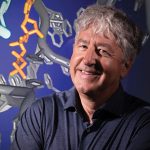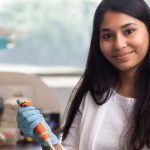An affinity group network launched at the Salk Institute in 2020 with the founding of two groups: the Black Association at Salk (BAS) and Underrepresented Minorities Actively Supporting Excellence (URMase). The network soon added two more groups: Asian Pacific Islander and Desi at Salk (APIDAS) and the Salk Pride Society (SPS).
Affinity groups enhance wellbeing and strengthen the Salk culture by uniting trainees and employees from particular identities and allies of diverse backgrounds. The groups provide a platform to discuss, understand, and define the interests of its members and their shared experiences at the Institute and in the community.
Each group has a unique focus and mission, but all share a commitment to enriching life at Salk. The groups operate under the guidance of the Institute’s Diversity, Equity & Inclusion team, in particular Program Manager Lauren Mitchell.
“I’m so proud of the positive impact our affinity groups are having on the campus experience,” Mitchell says. “They are a forum for practicing solidarity and seeking understanding. I’ve been inspired by how passionately members of our community embrace and support these groups.”
The affinity groups have played a crucial role in bringing members of the Institute together in a spirit of inclusion, deeper understanding, and educational celebrations, like Juneteenth, Día de los Muertos, and Lunar New Year, which were celebrated campus-wide.
Each group is in charge of defining its mission and identifying opportunities that celebrate our campus population and promote increasing diversity in alignment with Salk’s scientific mission.
Examples of such activities include an interactive session hosted by URMase and the Institute’s Grants Development office last fall, which featured Marguerite Matthews, National Institute of Neurological Disorders and Stroke program director, who began her own scientific journey as a high school summer intern at Salk. Matthews spoke on maximizing government funding opportunities—a workshop called “Demystifying Diversity Supplements.”
And in February, BAS hosted numerous on-campus educational and interactive activities in recognition and support of Black History Month, including a first of its kind “Black in STEM” panel discussion, which brought together outstanding researchers from Black in Cancer, Black in Immuno, and Black in Neuro to discuss the issues faced by Black researchers and the critical work of these organizations.
“The affinity groups are grassroots in nature and reflect the broad interest on campus in participating in the Institute’s commitment to diversity, equity, inclusion, and belonging,” says Mallory Zaslav, vice president of Diversity, Equity & Inclusion. “Myriad identities are part of the Salk culture. By coming together to recognize, involve, and educate our campus community about our colleagues, each group is actively building the future of Salk. The outreach they do and inspire in others is a testament to our collective responsibility as part of this organization to be good ancestors.”






























































